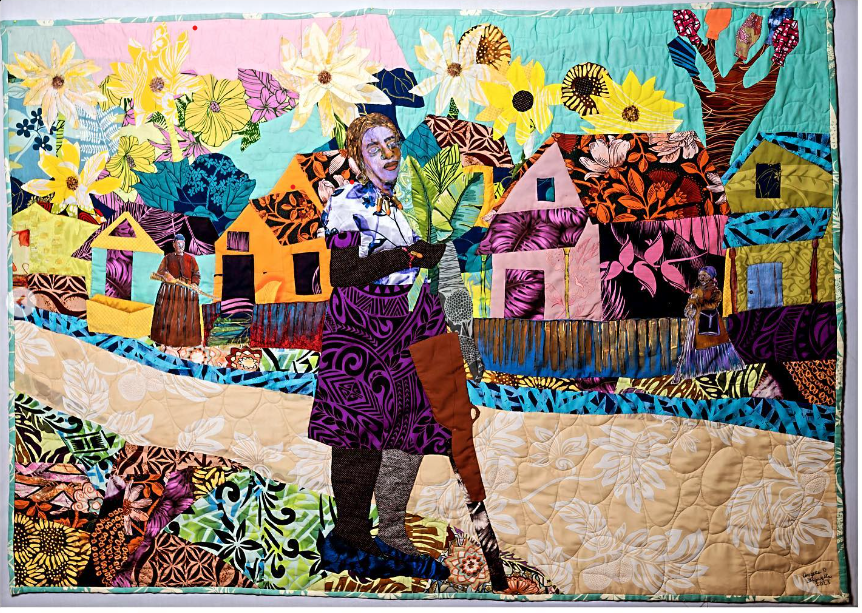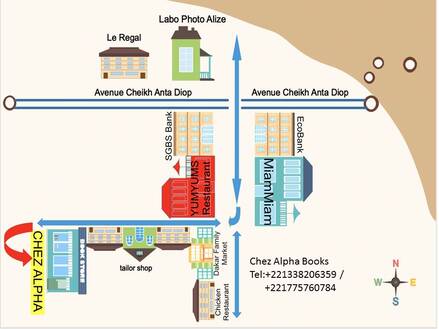
Art Work by Artist Angela Franklin Commissioned by Acres of Ancestry
Cincinnati native, artist Angela Franklin recently completed the first of three textile/ mixed media works commissioned by for Acres of Ancestry - a multidisciplinary, cooperative ecosystem rooted in Black ecocultural traditions and textile arts to regenerate custodial landownership, ecological stewardship, and food and fiber economies in the South.
Titled - Deaconess of Defense - For the Land and the People ( 45" x 65" x 3/4") this is the first of three works that take as their theme the importance of equity in land ownership and a history of resistance and defense often needed to achieve this goal.
In her artist statement Franklin says, "In 2020, while cleaning out my parent's home, I found a 1940s Remington shotgun, two pistols, a BB gun, and many bags of bullets! The guns and bullets of varying sizes were tucked away in different locations in the house. I had always known that there was often a shotgun kept behind the kitchen door yet the collection of guns made me think...
Continue reading: https://bit.ly/3SDnmh0
Biography:
With a BA in Art from Xavier University, Cincinnati, Ohio, and her MFA from Bradley University,
Peoria, Illinois, Angela Franklin-Faye has exhibited her works throughout the US and
internationally. A native of Cincinnati, Ohio, she has lived and worked abroad since 1997 in
Senegal, the United Arab Emirates, Nigeria, and the Pacific Island region. This international
experience has resulted in a body of work that celebrates and chronicles The Diaspora
experience globally. Continue reading: bit.ly/3WYGmq6
With a BA in Art from Xavier University, Cincinnati, Ohio, and her MFA from Bradley University,
Peoria, Illinois, Angela Franklin-Faye has exhibited her works throughout the US and
internationally. A native of Cincinnati, Ohio, she has lived and worked abroad since 1997 in
Senegal, the United Arab Emirates, Nigeria, and the Pacific Island region. This international
experience has resulted in a body of work that celebrates and chronicles The Diaspora
experience globally. Continue reading: bit.ly/3WYGmq6
HEARTS OF LIBERATION: A Celebration of Radical Black Love as Collective Care

"CAUSE THE BUS WAS TOO YELLOW" is the first in the Then You Read series inspired by James Baldwin who said, "You think your pain and your heartbreak are unprecedented in the history of the world, but then you read. It was books that taught me that the things that tormented me most were the very things that connected me with all the people who were alive, who had ever been alive.” This work pays homage to noted civil rights activist Fannie Lou Hammer, an authentic voice of Mississippi, the struggle of black people in Mississippi, and her fight for collaborative economics.
In 1969, she founded Freedom Farm (an agricultural cooperative) and purchased 40 acres of rich Delta land with donated money. Her vision was to provide sharecroppers with their own piece of land. The organization also brought 35 female pigs and 5 boars. Within a few years, thousands of new pigs were born and shared with poor families. Fannie was committed to offering a way for local sharecroppers, tenant farmers, and domestic workers to pursue community wellness, self-reliance, and political resistance. I envision that both land and income generated from the pigs also allowed the farmers to create homes. For me, Fannie Lou Hammer supported people to live off and within the land.
The title of this work comes from an experience she had on August 31, 1962. She had traveled with others to the courthouse in Indianola, Mississippi to try to register to vote.
After finishing this test, they started on the trip back to Ruleville, Mississippi, and were stopped by a city policeman and a state highway patrolman. They were ordered to get off the bus. After they got off the bus, they were ordered to get back on the bus and told to go back to Indianola. When they got back to Indianola the bus driver was charged with driving a bus the wrong color. They were told the bus was too yellow! Fannie loved and fought for her people. Say her name!
This piece she hangs in the Hearts of Liberation: A Celebration of Radical Black Love as Collective Care at the Kennedy Heights Art Center, Cincinnati, Ohio at the Kennedy Heights Art Center, Cincinnati, Ohio through June, 2024.
In 1969, she founded Freedom Farm (an agricultural cooperative) and purchased 40 acres of rich Delta land with donated money. Her vision was to provide sharecroppers with their own piece of land. The organization also brought 35 female pigs and 5 boars. Within a few years, thousands of new pigs were born and shared with poor families. Fannie was committed to offering a way for local sharecroppers, tenant farmers, and domestic workers to pursue community wellness, self-reliance, and political resistance. I envision that both land and income generated from the pigs also allowed the farmers to create homes. For me, Fannie Lou Hammer supported people to live off and within the land.
The title of this work comes from an experience she had on August 31, 1962. She had traveled with others to the courthouse in Indianola, Mississippi to try to register to vote.
After finishing this test, they started on the trip back to Ruleville, Mississippi, and were stopped by a city policeman and a state highway patrolman. They were ordered to get off the bus. After they got off the bus, they were ordered to get back on the bus and told to go back to Indianola. When they got back to Indianola the bus driver was charged with driving a bus the wrong color. They were told the bus was too yellow! Fannie loved and fought for her people. Say her name!
This piece she hangs in the Hearts of Liberation: A Celebration of Radical Black Love as Collective Care at the Kennedy Heights Art Center, Cincinnati, Ohio at the Kennedy Heights Art Center, Cincinnati, Ohio through June, 2024.
RECLAMATION

Art Moment: This work is currently on view in the RECLAMATIONS Exhibit at the Southampton History Museum. Titled, "She Held the Land-Knowing the Land Belonged to the Living and the Future." This exhibit seeks to explore the multifaced ways in which artists can engage with the act of reclaiming - be it physical space, historical narratives, personal/family stories, or cultural identity and representations.
https://lnkd.in/gR9P_pRB |


